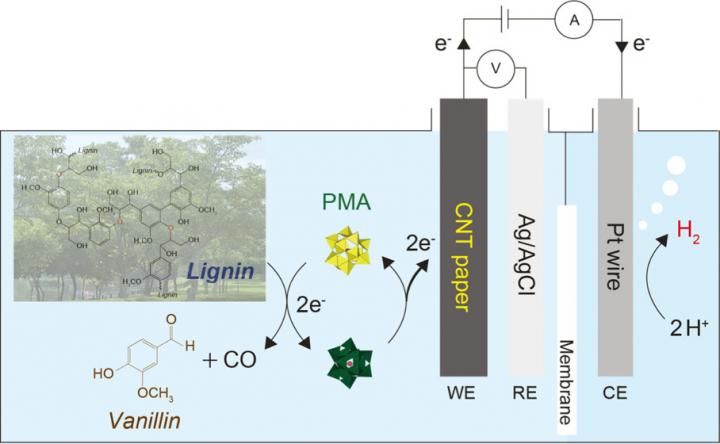
Credit: UNIST
A novel technology has been developed for hydrogen production from the process, which involves electron that is produced during the decomposition of biomass such as waste wood. The result produced after biomass decomposition is a high value-added compound, and it is a two-stone technology that improves the efficiency of hydrogen production.
A research team, led by Professor Jungki Ryu in the School of Energy and Chemical Engineering at UNIST has presented a new biofuel system that uses lignin found in biomass for the production of hydrogen. The system decomposes lignin with a molybdenum (Mo) catalyst to produce high value-added compounds, and the electrons extracted in the process effectively produce hydrogen.
An eco-friendly way of producing hydrogen is the electrolysis of water (H?O). The voltage is applied to the water to produce hydrogen and oxygen at the same time. However, in the currently reported technology, the oxygen generation reaction (OER) is slow and complicated, and hydrogen production efficiency is low. This is because hydrogen gas (H?) is produced by hydrogen ions (H?) as electrons, because these electrons come from the oxygen evolution reaction.
Through the study, Professor Ryu and his research team have developed a new biofuel system that uses lignin as an electron donor in a way to reduce the overall inefficiency of the oxygen evolution reaction (OER). This is the principle of using molybdenum-based inexpensive metal catalysts (PMA) to break down lignin at low temperatures, and extract the electrons produced in the process to produce hydrogen. The new device has been designed to move electrons from lignin, along the wire to the electrode where the hydrogen evolution reaction (HER) occurs.
“With this new system, we can produce hydrogen with less energy (overvoltage) than conventional water electrolysis, as there is no need for oxygen reactions, requiring high energy and precious metal catalysts,” says Hyeonmyeong Oh (Combined M.S/Ph.D. of Energy and Chemical Engineering, UNIST), the first author of the study. “Conventional methods require more than 1.5 volts, but the new system was capable of producing hydrogen at a much lower potential (0.95 volts).”
In addition, vanillin or carbon monoxide (CO), which are produced via lignin breakdown is very useful substance for various industrial processes. “Lignin, the second most naturally abundant biomass, is difficult to decompose. However, using molybdenum-based catalysts (PMA) it was easily degraded at low temperatures,” says Research Assistant Professor Yuri Choi, the co-author of the study.
“The new biofuel system is a technology that produces hydrogen and valuable chemicals using cheap catalysts and low voltages instead of expensive catalysts such as platinum (Pt),” says Professor Ryu. “Our work is also significant, as it presents a new way to replace oxygen-producing reactions in the electrolysis of water.”
###
The findings of this research have been published in ACS Catalysis on January 3, 2020. This study has been supported by the Technology Development Program to Solve Climate Changes through the National Research Foundation of Korea (NRF) funded by the Ministry of Science and ICT (MSIT).
Media Contact
JooHyeon Heo
[email protected]
82-522-171-223
Original Source
https:/




